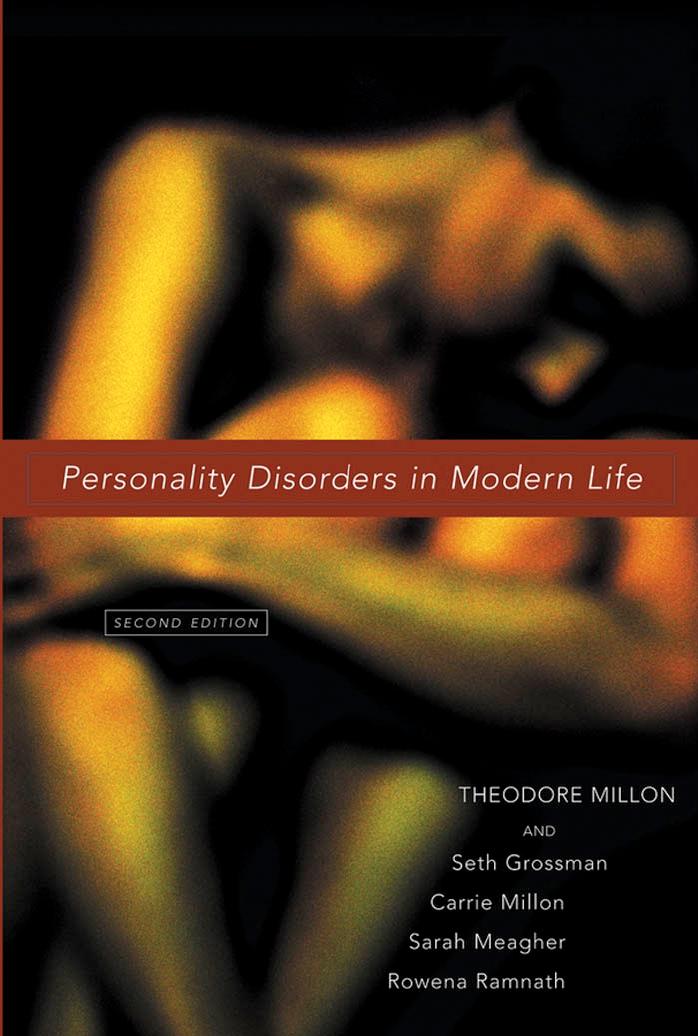Personality Disorders in Modern Life 2ND ED by THEODORE MILLON

Author:THEODORE MILLON [MILLON, THEODORE]
Language: eng
Format: epub, pdf
Published: 2012-12-11T07:34:59+00:00
c09.qxd 5/24/04 11:08 am Page 309
THE PSYCHODYNAMIC PERSPECTIVE
309
time, histrionics do not develop a strong superego because they have few qualms about transgressing commitments or manipulating those around them.
Consider Monique (Case 9.2), who has a lot going for her, but she cannot seem to remain monogamous. Like Yvonne, she seems to have a need for stimulation. New relationships excite her, though she quickly becomes bored, to the point that she feels the need to âreturn to partying and drinking.â Now that her writer husband has settled down, she feels the urge to return to the same pattern that produced her two previous divorces, the desire to begin a secret and exciting affair. When she presents for therapy, she exhibits many of the classical symptoms. Her emotions run the gamut from laughter to sadness. She sexualizes her interaction with the interviewer by deliberately creating sexual imagery. Her need for attention is consistent with her social butterfly, cheerleading history, becoming pathological in her depressive reaction when her girlfriend was voted homecoming queen and again in her interest in extramarital relationships. The impressionistic cognitive style of the histrionic is evident in her description of her high school years, and a theatrical, exaggerated emotionality can be seen in the dramatic flourish that accompanies it. Finally, there is evidence that she considers relationships to be more intimate than they really are. She married her first husband after having known him only three weeks, though, âIt felt like weâd known each other all our lives.â
She probably feels the same way about her lovers, something that justifies each affair and contributes to its beginning.
If Moniqueâs superego development were more robust, such desires would either be inhibited or never reach consciousness. Moreover, if her ego identity were more solidly anchored, she would long ago have developed goals that would further define her place in the world and give meaning to her existence, and she probably would not have a history of nontraditional life choices or alcohol abuse. Like other histrionics, Monique has short-circuited her natural developmental process. By sexualizing relationships prematurely, histrionics lure powerful others toward them so they may ease their way, reward their desires, and reduce their frustrations. Like other histrionics, Monique has no desire to develop a deep, abiding, solid sense of identity. Thus, histrionics remain, as W. Reich (1933) noted, âthinly armored,â with only a veneer of selfhood to cover the drives and dependencies of an infantile id. As such, they continue to be dominated by the pleasure principle, as expressed through their need to be the center of attention; persistent stimulus-bound and sensation-seeking behavior; dramatic, theatrical displays; and even primitive regressions into fantasy, called primary process thinking. When anxiety threatens, their thin self tends to fragment or dissociate under the strain, regresses into primitive fantasy, or redirects stress somatically into the body, where it reappears as symptoms not easily accounted for by a legitimate medical condition, possibly Yvonneâs situation.
The development of the higher functioning hysterical personality is similar to that of the histrionic, in that both have oral-dependency concerns.
Download
Personality Disorders in Modern Life 2ND ED by THEODORE MILLON.pdf
This site does not store any files on its server. We only index and link to content provided by other sites. Please contact the content providers to delete copyright contents if any and email us, we'll remove relevant links or contents immediately.
What's Done in Darkness by Kayla Perrin(25493)
Shot Through the Heart: DI Grace Fisher 2 by Isabelle Grey(18209)
Shot Through the Heart by Mercy Celeste(18153)
The Fifty Shades Trilogy & Grey by E L James(17768)
The 3rd Cycle of the Betrayed Series Collection: Extremely Controversial Historical Thrillers (Betrayed Series Boxed set) by McCray Carolyn(13182)
The Subtle Art of Not Giving a F*ck by Mark Manson(12898)
Scorched Earth by Nick Kyme(11823)
Stepbrother Stories 2 - 21 Taboo Story Collection (Brother Sister Stepbrother Stepsister Taboo Pseudo Incest Family Virgin Creampie Pregnant Forced Pregnancy Breeding) by Roxi Harding(11019)
Drei Generationen auf dem Jakobsweg by Stein Pia(10211)
Suna by Ziefle Pia(10179)
Scythe by Neal Shusterman(9251)
International Relations from the Global South; Worlds of Difference; First Edition by Arlene B. Tickner & Karen Smith(8600)
Successful Proposal Strategies for Small Businesses: Using Knowledge Management ot Win Govenment, Private Sector, and International Contracts 3rd Edition by Robert Frey(8407)
This is Going to Hurt by Adam Kay(7682)
Dirty Filthy Fix: A Fixed Trilogy Novella by Laurelin Paige(6445)
He Loves Me...KNOT by RC Boldt(5798)
How to Make Love to a Negro Without Getting Tired by Dany LaFerrière(5369)
Interdimensional Brothel by F4U(5299)
Thankful For Her by Alexa Riley(5149)
